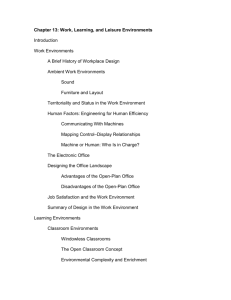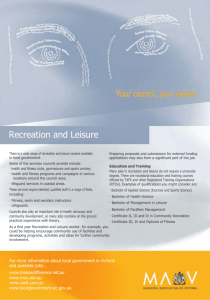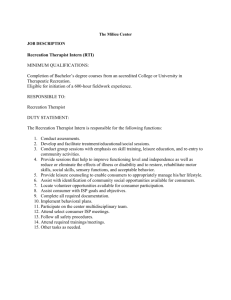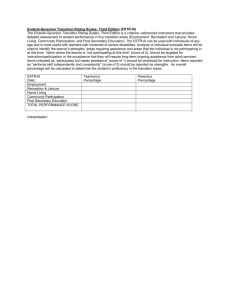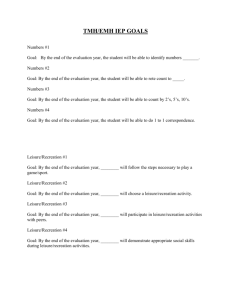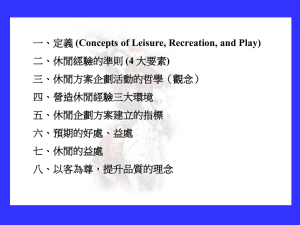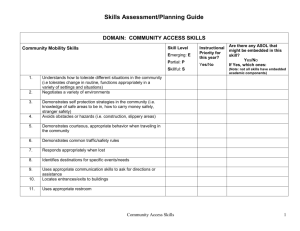REC 160 Intro to Rec & Leisure
advertisement
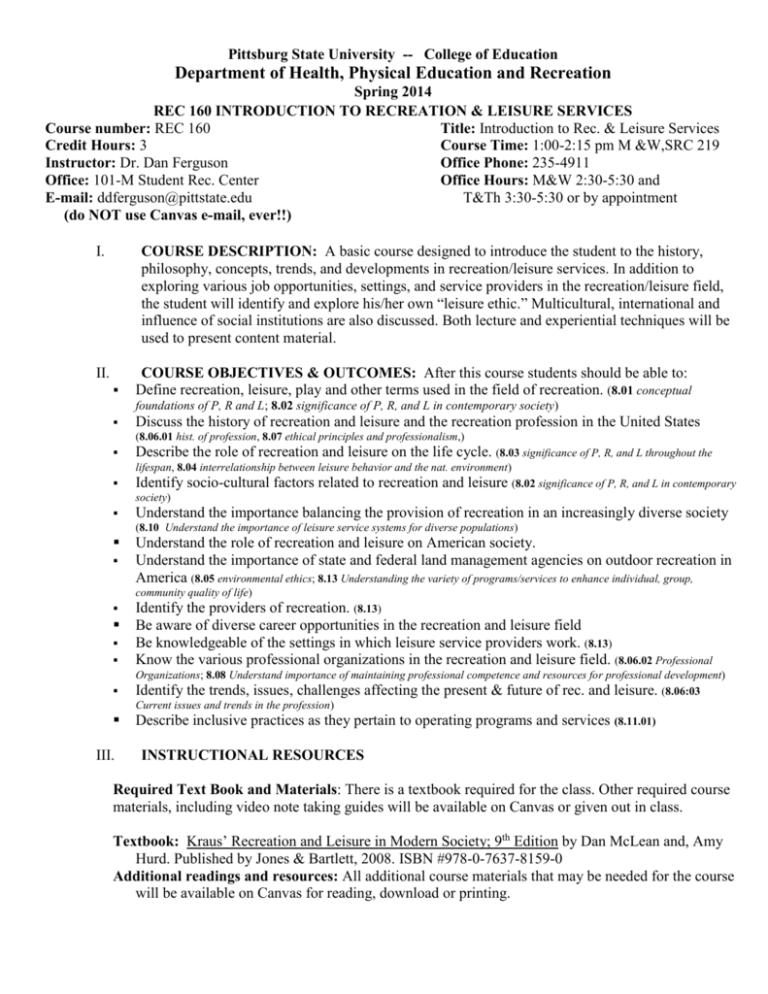
Pittsburg State University -- College of Education Department of Health, Physical Education and Recreation Spring 2014 REC 160 INTRODUCTION TO RECREATION & LEISURE SERVICES Course number: REC 160 Title: Introduction to Rec. & Leisure Services Credit Hours: 3 Course Time: 1:00-2:15 pm M &W,SRC 219 Instructor: Dr. Dan Ferguson Office Phone: 235-4911 Office: 101-M Student Rec. Center Office Hours: M&W 2:30-5:30 and E-mail: ddferguson@pittstate.edu T&Th 3:30-5:30 or by appointment (do NOT use Canvas e-mail, ever!!) I. COURSE DESCRIPTION: A basic course designed to introduce the student to the history, philosophy, concepts, trends, and developments in recreation/leisure services. In addition to exploring various job opportunities, settings, and service providers in the recreation/leisure field, the student will identify and explore his/her own “leisure ethic.” Multicultural, international and influence of social institutions are also discussed. Both lecture and experiential techniques will be used to present content material. II. COURSE OBJECTIVES & OUTCOMES: After this course students should be able to: Define recreation, leisure, play and other terms used in the field of recreation. (8.01 conceptual foundations of P, R and L; 8.02 significance of P, R, and L in contemporary society) Discuss the history of recreation and leisure and the recreation profession in the United States (8.06.01 hist. of profession, 8.07 ethical principles and professionalism,) Describe the role of recreation and leisure on the life cycle. (8.03 significance of P, R, and L throughout the lifespan, 8.04 interrelationship between leisure behavior and the nat. environment) Identify socio-cultural factors related to recreation and leisure (8.02 significance of P, R, and L in contemporary society) Understand the importance balancing the provision of recreation in an increasingly diverse society (8.10 Understand the importance of leisure service systems for diverse populations) Understand the role of recreation and leisure on American society. Understand the importance of state and federal land management agencies on outdoor recreation in America (8.05 environmental ethics; 8.13 Understanding the variety of programs/services to enhance individual, group, community quality of life) III. Identify the providers of recreation. (8.13) Be aware of diverse career opportunities in the recreation and leisure field Be knowledgeable of the settings in which leisure service providers work. (8.13) Know the various professional organizations in the recreation and leisure field. (8.06.02 Professional Organizations; 8.08 Understand importance of maintaining professional competence and resources for professional development) Identify the trends, issues, challenges affecting the present & future of rec. and leisure. (8.06:03 Current issues and trends in the profession) Describe inclusive practices as they pertain to operating programs and services (8.11.01) INSTRUCTIONAL RESOURCES Required Text Book and Materials: There is a textbook required for the class. Other required course materials, including video note taking guides will be available on Canvas or given out in class. Textbook: Kraus’ Recreation and Leisure in Modern Society; 9th Edition by Dan McLean and, Amy Hurd. Published by Jones & Bartlett, 2008. ISBN #978-0-7637-8159-0 Additional readings and resources: All additional course materials that may be needed for the course will be available on Canvas for reading, download or printing. IV. TEACHING STRATEGIES: A variety of teaching strategies will be used in the class including lecture, class discussion, video or slides, guest speakers and library research. V. EVALUATION, WEIGHTING SYSTEM AND GRADE ASSIGNMENT (Reminder—To be accepted to the Recreation major you must earn at least a 2.5 gpa in REC 160 and 240. You must ALSO have a 2.5 gpa in the major to be allowed to do an internship in the major) This class is NOT graded on a curve. It is a required course in the major. It is also one of two pre-requisite courses for which students must obtain an average of 2.5 to be accepted into the major. By using a weighted grading system every student has an equal opportunity to receive an A grade. Your final grade will be based on your own achievement in the class rather than your performance compared to all others in the class. Thus, the only person you are competing against in the class is yourself. You can also decide which aspects of the course you want to focus your energy on in order to obtain the grade you most desire. It is EASY to earn an A or B grade in this class if you do just 5 things: Come to class each day and be here when roll is taken (if you are not here you will be counted as absent unless you see me after class to make sure you are on the roll sheet for that class period). Review your syllabus each day, keep up with the reading and make sure you do any homework assignments that may be given and turn them in ON TIME. Homework and other assignments will be collected at the beginning of class and that is when they are due. Assignments turned in after class; even the same day, will be counted as late. Do the assigned reading before class. Reading assignments are light enough that no one should have difficulty. There will be 4 unannounced quizzes during the semester based on the reading for a particular day. Prepare well for exams and take advantage of the opportunity to use hand written notes during tests. Approx. 65% of every exam is taken from the book. You NEED the book. Turn assignments in on time. All late assignments will be downgraded at least 10% unless you have a doctor’s excuse. Assignments will not be accepted after 3 days. Late assignments will be taken to the department secretary to have the date and time the assignment was turn in put on them. Assignments without a submission date and time will not be accepted. Take advantage of all extra credit opportunities (these usually get you a grade bump) Take good notes in class Assignment 3 page essay 2 page essay Inventory of Your Leisure Time 5 page research paper 4 Exams 10% each Class Attendance H’work, In Class Exercises, Unannounced Quizzes TOTAL 90-100% 80-89% 70-79% 60-69% <60% VI. A B C D F Grade Scale Excellent Above average Average Below average Not passing Weight Wt Pts 10% of grade 10 10% of grade 10 10% of grade 10 15% of grade 15 40% of grade 40 5% of grade 5 10% of grade 10 100% of grade 100 EXPECTATIONS OF STUDENTS: This class is a professional preparation course. It is the first in a series of professional preparation courses for students planning a career in some aspect of the recreation field. A basic understanding of recreation behavior is important to those who will affect the lives of thousands of people over the course of their careers and make decisions concerning the use of millions of dollars that they are given stewardship over. This course is important and I am committed to a high expectation for myself as the instructor. I hope you will commit yourself to an equally high standard as a participant in the class. The following policies are not meant to be harsh, demeaning or punitive. They are intended to prevent disruption and distraction by those students for whom they are intended. Class Attendance. Attendance will be taken each class period. You need to be here when the roll is taken and remain for the entire class or you will receive an unexcused absence. Absence for any reason that has not been pre-arranged with the instructor or within 24 hours of the class you missed will be counted as unexcused. This includes absences for athletic competition. You are permitted two unexcused absences. At your third unexcused absence you grade will be lowered one grade. At 4 unexcused absences you will be dropped from the class for lack of attendance. Athletes must notify me in advance of all absences or they will be unexcused. Completion of Assignments. Assignments are due at the beginning of the class period that they are due. Points will be deducted for lateness at 12% per day for up to 2 calendar days. After that assignments will not be accepted. It is ALWAYS better to turn an assignment in late than not at all. Receiving some credit is better than getting a 0 on any assignment. Do not e-mail assignments to me---ever! They will not be accepted. Class Format. The scheduled class time is from 1:00 to 2:15 pm. There may be a few times when the class will run a few minutes longer but those days are usually offset by finishing a few minutes early. But the class ends when the instructor finishes. Do not put things away early. Academic Honesty. I expect absolute honesty from all students in the completion of assignments and will accept nothing less. Cheating in any form will not be tolerated and you will either be dropped from the class or given an F. Your personal integrity is one of your most important possessions but sadly I am now required to include the following PSU policy on personal integrity. ACADEMIC INTEGRITY POLICY Academic dishonesty by a student is defined as unethical activity associated with course work or grades. It includes, but is not limited to: (a) Giving or receiving unauthorized aid on examinations. (b) Giving or receiving unauthorized aid in the preparation of notebooks, themes, reports, papers or any other assignments. (c) Submitting the same work for more than one course without the instructor’s permission, and, (d) Plagiarism. Plagiarism is defined as using ideas or writings of another and claiming them as one’s own. Copying any material directly (be it the work of other students, professors, or colleagues) or copying information from print or electronic sources (including the internet) without explicitly acknowledging the true source of the material is plagiarism. Plagiarism also includes paraphrasing other individuals’ ideas or concepts without acknowledging their work, or contribution. To avoid charges of plagiarism, students should follow the citation directions provided by the instructor and/or department in which the class is offered. The above guidelines do not preclude group study for exams, sharing of sources for research projects, or students discussing their ideas with other members of the class unless explicitly prohibited by the instructor. Since the violation of academic honesty strikes at the heart of the education process, it is subject to the severest sanctions, up to and including receiving an “F” or “XF” (an “XF” indicates that “F” was the result of academic dishonest) for the entire class and dismissal from the university. For a full copy of this policy see: http://catalog.pittstate.edu/contentm/blueprints/blueprint_display.php?bp_listing_id=162&blueprint_id=124&sid=1&menu_id=7980 Class grievance procedure. If at any point you find yourself in a situation where you are upset with me the proper way to handle that is to talk with me directly and in private (even by e-mail if need be). Nearly any problem can be worked out to your advantage if we talk about it. It would be unethical of me to penalize a student for expressing concern. So if you ever do have a concern, let’s talk. Almost always things work out in your favor. Exam Policies. I want you to do well on exams and for major exams you may bring to class any notes (original and handwritten only) that you would like on a single 8 ½ x 11 inch sheet of paper. Don’t put off your studying or think that notes are a substitute for studying. They are not and it will help you to begin making notes as you do your reading each week. A word of FAIR WARNING: Those who fail to read usually fail my exams. Power Points from class will NOT be put on Canvas. You should make sure you take good notes in class. Watch for Study Alerts! Classroom Etiquette: It is really important in any class to be respectful of others as well as respectful of the instructor. Please follow these simple rules of decorum in the classroom. 1. If you are late for class please slip in as quietly as possible and take the first available seat so as to minimize the disturbance you have created. 2. Take care of personal needs BEFORE class. If you need to leave class for ANY reason you are not allowed to disturb the class a second time by coming back in. 3. Cell phones – please be sure your cell phone is either turned off or set to ‘silent’ (not vibrate). Calls or text messages are NEVER to be taken during class. DO NOT send text messages during class. This is not only rude but a distraction for students and a huge distraction for the instructor. I will ask to hold your phone until the end of class. 4. iPods and other electronic devices– please remove ear buds during class and do not be listening to your iPod or other electronic devices at any time during class. 5. Food – please do not bring food into the classroom at any time, for any reason unless you plan to share it with the entire class. It is okay to bring water or soda into the class as long as you take your container with you when you leave. 6. Laptops – Laptops in this classroom are a privilege not a right. There is no problem with using your laptop for note taking purposes. Any other use of your laptop during class time is extremely rude and inconsiderate. It is easy to tell when people are using laptops for purposes other than note taking and you will lose the laptop privilege if you are discovered chatting, e-mailing, web browsing, facebook, Twitter, etc. VII. Extra Credit Opportunity: I enjoy getting to know my students and learn as much as I can about them, their experience at PSU, in the department, their life experiences, etc. If you schedule an appointment and come in to visit with me for 10 minutes before Dead Week you will earn 10 extra credit points. A good time for an appointment is usually right after class each week. I hope each of you will want to take advantage of this opportunity but I will not remind you again that it is available. DESCRIPTION OF ASSIGNMENTS FOR REC 160 First 3 page essay – (January 15) This paper requires no reading or outside research! The assignment is simply this----Think of the most memorable or meaningful event of your life to this point, no matter what it is. Try to recall as much detail about that experience as you can. The event may be something that happened very quickly (you were skydiving and your main parachute didn't open so you had to use your emergency parachute) or something that took some time to unfold (you climbed Mount Everest and it took 3 months). The choice is completely up to you. Write a descriptive paper about that experience (3 pages of text, double spaced, 1 inch margins all the way around, New Times Roman font, 12 point type, stapled with a cover page containing the title of your paper, your name, due date of assignment, class number and title. A portion of your grade will be based on these things.). Describe the experience with as much detail as you can, tell who you were with or if you were alone, explain what emotions or feelings you associate with that event, and explain why this particular experience is so memorable or meaningful to you. (10% of grade) Second essay – 2 pages – (February 12) As a recreation professional you will be making decisions based upon various aspects of your personal philosophy. The purpose of this assignment is to help you begin thinking about what you believe about two things. Your paper needs to address two questions---“What is the purpose of life?” and “What is the purpose of recreation in one’s life.” The paper should be double spaced with New Times Roman font, 10 to 12 point and 1 inch margins all around. Put a cover page on the paper with your name, the name and number of the class and instructor name and title of the paper. (10% of grade) [NRPA 8.01, 8.03] Inventory of Your Leisure Time – (February 26) For this assignment you will be given a form that will be used to account for the use of your time for 1 week (168 hours). You will keep track of your activities 24 hours per day for seven days and fill them in on the form. Then you will separate your time into several categories (work, sleep, school, leisure, etc.). You will graph your use of time and answer some questions about your results. The form and materials you need will be distributed in class. (10% of grade) Five page research paper – (See schedule) This will be a library research paper. Technical aspects of the paper will be graded closely. This paper must be in APA format (American Psychological Association) and will also have a reference page in APA style. Your paper must focus on one of the following topics: Is there any proof that computers & video games are contributing to childhood obesity? (8.06.03) Would Kansas kids be thinner if P.E. were required at every grade level? Where’s the proof? (8.02, 8.03) What are the impacts of legalized gambling on a community? (8.12.01, 8.12.02) Is there evidence that recreation really strengthens families? (8.02) Agencies like Boys and Girls Clubs, and Boy Scouts of America claim to build character in kids. But do they really? (8.11.01) Are Paralympians really athletes in the same way that Olympians are athletes? (8.11.01) The purpose of this assignment is to help you learn to find relevant information on a particular topic, to clarify issues or sides of an argument, to take a position based upon evidence from the literature and to articulate that position in writing. Therefore your paper must have at least 5 references cited in the body of your paper, ALL of which must be from referee journal articles or books (e-books or print) and not from magazines, newspapers, Wikipedia or the internet websites. (10 points). The intent is for you to use library and other sources of authoritative information. Your paper should be well organized with a cover page and a nice introduction to the topic (10 points), a discussion of the topic from several points of view (10 points), your opinion or view of the issue or topic (20 points), and finally a brief summary of the points you have made (10 points). You should let the question you choose become the title of your paper. You will be graded on how well you answer the question and present your position. Your paper should be stapled with a proper cover page (5 points). The paper should be proofread for accuracy in grammar, spelling and style (5 points). References should be properly cited in APA (American Psychological Association) format both within the text and in a reference page at the end of the paper (5 points). (15% of grade) 4 Exams (Tentatively: Feb 10, Mar 12, Apr 14, May 5) – All exams have the same value. Exams will cover any assigned material from the class textbook. All exams will cover the assigned articles and material presented in class. All assigned reading and information presented in class (lecture, video, guest speaker, etc.) will be considered fair material to present on an examination. Students may, however, bring to the exam any hand written notes they wish to use on both sides of an 8 ½ x 11 inch sheet of paper. This paper may be used during the exam but not other books, articles, video note taking guides, etc. (10% each or 40% of grade) Class Attendance – (5% of grade) Class attendance is important. We need your presence so you can be part of discussions and make a contribution. Please share your ideas with others. Everyone in the class comes from a different background and good ideas to contribute. You will also be here to do the in-class exercises that will be very important to improving your grade. In Class Exercises – (10% of grade) These are short, 5 point writing exercises in which you will express an opinion, complete a task or be part of a group problem solving exercise. There will be 5-6 of these throughout the semester. They will be unannounced and may come at any point during the class. If you are there you will receive full credit. If you are not there you will receive a 0 on the exercise and it cannot be made up. TENTATIVE CLASS READING AND ASSIGNMENT SCHEDULE (Topics subject to change if needed but you will be notified in advance) DATE CLASS TOPIC READINGS & ASSIGNMENTS DUE Mon, Jan 13 Wed, Jan 15 Mon, Jan 20 Wed, Jan 22 Syllabus review; Defining Recreation, Leisure, Play; Life satisfaction/happiness; Martin Luther King Holiday—No class Lifestyle; Motivation / Constraints (8.01) Time Concepts; Theories of Leisure; Flow Theory (8.01) History of Leisure: Ancient Societies thru Industrial Revolution (8.02, 8.03) - - History of Leisure 20th Century Development of the Leisure Profession (8.02, 8.03, 8.06.01) Recreation and Leisure Today (8.02, 8.06.01) Exam 1 – Chapts 1-3 videos, class notes, etc Chap 1: Recreation and Leisure: The current scene (8.06.03) 3 page essay due—Wednesday 1/15 Chap 2: Basic Concepts: Philosophical Analysis of Play, Recreation and Leisure (8.01) Mon, Jan 27 Wed, Jan 29 Mon, Feb 3 Wed, Feb 5 Mon, Feb 10 Wed, Feb 12 Recreation in the life course: Children, Adolescents, Adults (8.03) (Leisure time inventory given out) Mon, Feb 17 Recreation in the life course: Children, Wed, Feb 19 Adolescents, Adults (8.03) Mon, Feb 24 Socio-cultural Factors effecting Leisure (8.10) Wed, Feb 26 Public Recreation Services: City, County (8.08, 8.02) Mon, Mar 3 Video: Benefits of Rec: Fitting the pieces together Wed, Mar 5 Public Recreation Services: State & Federal Agencies (8.02, 8.04, 8.05, 8.08) Mon, Mar 10 Videos: Mark Twain Nat’l Forest & U.S. Forest Service Wed, Mar 12 Exam 2 – Chapters 4-6, videos & class Mon, Mar 17 Spring Break Wed, Mar 19 Spring Break Mon, Mar 24 Youth Serving Agencies and NGO’s in Wed, Mar 26 America (8.13, 8.08) Mon, Mar 31 Therapeutic Recreation & Sport for persons Wed, Apr 2 with disabilities; Videos: National Ability Center, Missouri Rehab (8.13, 8.11.01) Mon, Apr 7 Travel & Tourism in Kansas (8.12.01, 8.12.02) Wed, Apr 9 The dark side of leisure—Tharina Peterson Mon, Apr 14 Exam 3 – Chapters 7-9 Wed, Apr 16 TBA Mon, Apr 21 Fitness and Sport Management (8.13, 8.08) Wed, Apr 23 Joplin Sports Authority – Craig Hull speaker Mon, Apr 28 Career Opps and Professionalism (8.09, 8.11) Wed, Apr 30 Future rec and leisure in the 21st Century Video: Professional Involvement-It’s your choice Mon, May 5 Exam 4 – Chapters 10 thru 13 1:00 – 2:50 Chap 3: Early History of Rec and Leisure (8.06.01) Chap 4: Rec & Leisure in the Modern Era (Wed) Bring Scantron, pencil and 1 page of hand written notes Chap 4: Continued 2 page essay due - Wednesday Chap 5: Personal Leisure Perspectives: Motivations and Age Group Factors (8.03, 8.04) Chapter 6: Socio-cultural Factors effecting Leisure 5 Page Due (A thru F) Monday Leisure Time Inventory due Wednesday Chap 7: Social Functions of Community Recreation Chap 8: The leisure service system: Governmental p 197-211 only (8.02, 8.04 5 Page Due (G thru O) Monday Bring Scantron, pencil, 1 page of hand written notes Wenesday Spring Break Spring Break Chap 8: The Leisure-Service System: Nonprofit and Commercial Recreation Agencies pp 216-234 Chap 9: Specialized Leisure-Service Areas 5 Page Due (M thru S) —Wednesday Chap 10: Travel & Tourism Bring Scantron, pencil and 1 page of notes 5 Page Due (T thru Z) —Wednesday Chap 11: Sport as Leisure Chap 12: Career Opportunities and Professionalism Chap 13: Future Perspectives of Rec and Leisure

